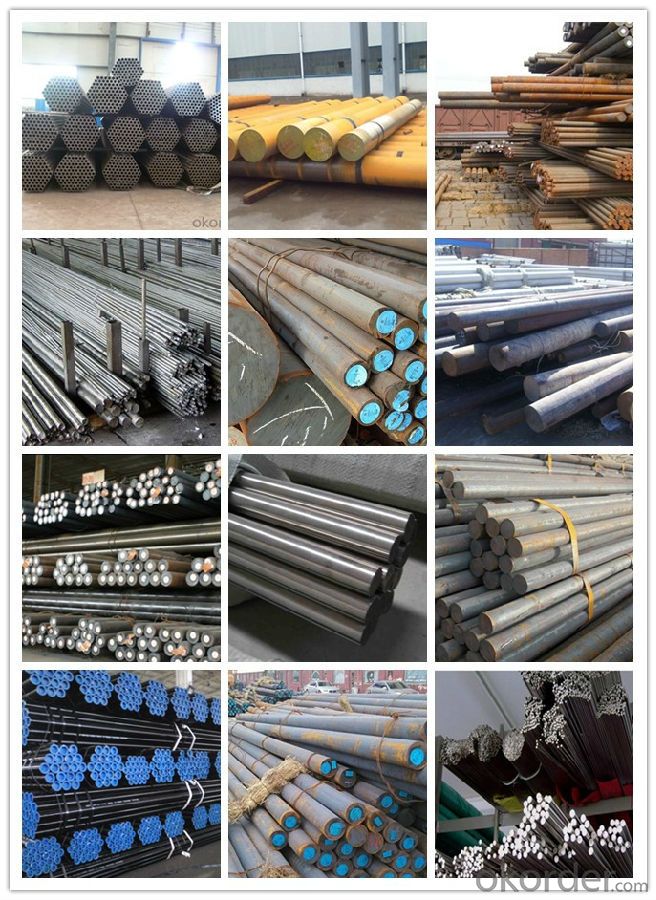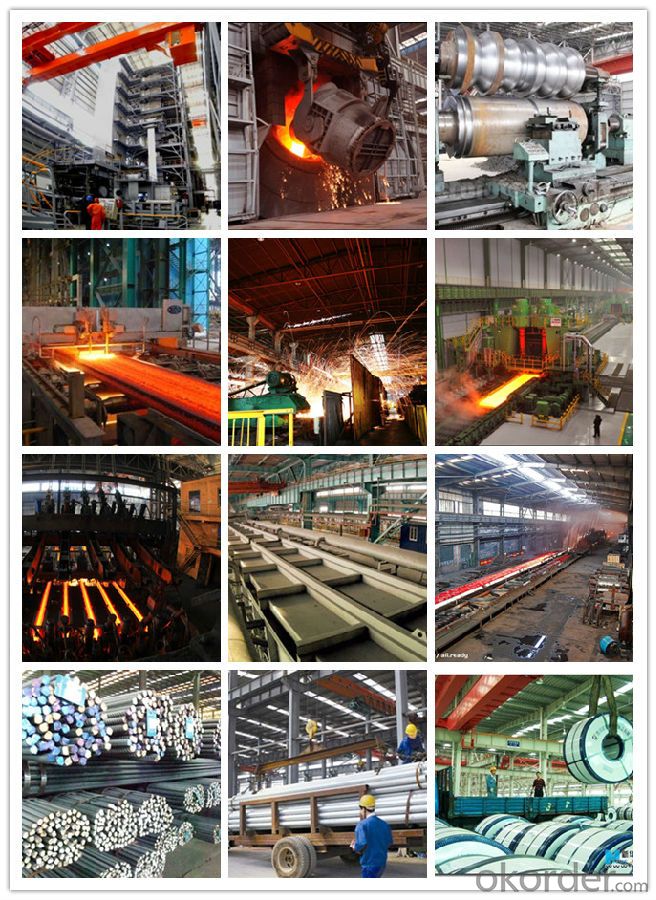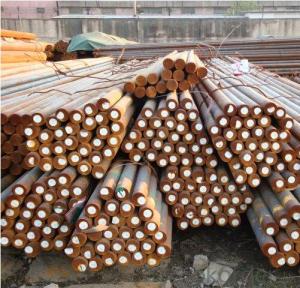Alloy Steel Cr12MoV Metal Steel Round Bars Special Steel
- Loading Port:
- China main port
- Payment Terms:
- TT OR LC
- Min Order Qty:
- 30 m.t.
- Supply Capability:
- 10000 m.t./month
OKorder Service Pledge
OKorder Financial Service
You Might Also Like
Item specifice
Chemical Composition(%)
| Country | Standard | C | Si | Mn | Cr | Mo | V | S | P | W |
| GB | C12MoV | 1.45-1.70 | ≤0.40 | ≤0.40 | 11.00-12.5 | 0.40-0.60 | 0.15-0.30 | ≤0.030 | ≤0.030 | |
| DIN | 1.2601 | 1.55-1.75 | 0.25-0.40 | 0.20-0.40 | 11.00-12.0 | 0.50-0.70 | 0.10-0.50 | ≤0.030 | ≤0.030 | 0.40-0.60 |
Available Size
| Rolled flat steel | 12-90mm×205-610mm×L |
| Forged flat steel | 100-300mm×400-600mm×L |
Heat Treatment
| Item | Temperature℃ | Hardness |
| Anneal | 850-880 | ≤255HB |
| Quenching | No.1:980-1040 | 60-63HRC |
| No.2:1050-1130 | 42-50HRC | |
| Tempering | No.1:200-300(1) | 57-60HRC |
| No.2:200-300(2-3) | 58-62HRC |
Characterstics
| 1.High hardening ability and abrasion resistance | ||||||||
| 2.Less quenching deformation | ||||||||
| 3.Higher toughness and more homogeneous carbide distribution than Cr12 steel |
Applications: Suitable for various complicated cold working dies with high precision and long lifetime,such as punching dies,cold extrusion dies,thread rolling dies,screw plates,cold extrusion dies,and precise measuring devices
Main Product
Plastic Mould Steel
DIN 1.2311,1.2738,1.2083,1.2316 etc.
AISI P20,P20+Ni,420 etc.
JIS SUS420J2
Hot Work Steel
DIN 1.2344,1.2343,1.2367,1.2365,1.2581,1.2713 etc.
AISI H13,H11,H10,H21, etc.
JIS SKD61,SKD6,SKD5,SKT4 etc.
Cold Work Steel
DIN 1.2739, 1.2601, 1.2080, 1.2436, 1.2631, 1.263, 1.2510, 1.2327 etc.
AISI D2, D5, D3, D6, A8, A2, O1 etc.
JIS SKD10, SKD11, SKD1, SKS3 etc.
High Speed Steel
DIN 1.3343, 1.3243, 1.3247, 1.3355 etc.
AISI M2, M35, M42, T1 etc.
JIS SKH51, SKH35, SKH59, SKH2 etc.
Alloy Structural Steel
DIN 1.7035,1.6511,1.7220,1.7225 etc.
AISI 5140, 4340, 4135, 4140 etc.
JIS SCr440,SNCM439,SCM435,SCM440 etc.
Stainless & Carbon Steel or Others
DIN 1.4125,1.1191 etc
AISI 440C,1045, 1020 etc.
JIS SUS440C,S45C etc
 Product show
Product show
Workshop show

Shipping
1. FedEx/DHL/UPS/TNT for samples, Door-to-Door;
2. By Air or by Sea for batch goods, for FCL; Airport/ Port receiving;
3. Customers specifying freight forwarders or negotiable shipping methods!
Delivery Time: 3-7 days for samples; 5-25 days for batch goods.
Payment Terms
1.Payment: T/T, L/C, Western Union, MoneyGram,PayPal; 30% deposits; 70% balance before delivery.
2.MOQ: 1pcs
3.Warranty : 3 years
4.Package Informations: 1) EXPORT, In 20 feet (GW 25 ton) or 40 feet Container (GW 25 ton)
2)as customer's requirement
Why choose us?
(1) The leading exporter in China special steel industry.
(2) Large stocks for various sizes, fast delivery date.
(3) Good business relationship with China famous factories.
(4) More than 7 years steel exporting experience.
(5) Good after-sales service guarantee.
- Q:How does quenching and tempering affect the hardness of special steel?
- Quenching and tempering significantly impact the hardness of special steel. Quenching involves rapidly cooling the steel from a high temperature, which results in a hard and brittle structure. On the other hand, tempering involves reheating the quenched steel to a specific temperature and then cooling it slowly, which reduces the brittleness and increases the toughness of the steel while maintaining a desired level of hardness. Overall, this heat treatment process modifies the microstructure of the steel, leading to a controlled increase in hardness while improving its mechanical properties.
- Q:How does special steel contribute to the medical industry?
- Special steel contributes to the medical industry by providing the necessary materials for the production of medical equipment and devices. Its unique properties such as high strength, corrosion resistance, and biocompatibility make it ideal for manufacturing surgical instruments, implants, and prosthetics. Special steel also ensures the safety and effectiveness of medical tools, as it can withstand sterilization processes and maintain its integrity during procedures. Overall, special steel plays a crucial role in advancing medical technology and improving patient care.
- Q:Can special steel be used in the production of fasteners for high-stress applications?
- Yes, special steel can be used in the production of fasteners for high-stress applications. Special steel alloys like stainless steel or alloy steel offer enhanced strength, durability, and resistance to corrosion, making them suitable for demanding applications where fasteners are subjected to high loads or harsh environments. These special steel fasteners help ensure a secure and reliable connection, even under extreme stress conditions.
- Q:What are the properties of magnetic steel?
- Magnetic steel is characterized by its ability to attract and hold a magnetic field. It is typically a hard and strong material, making it suitable for various applications such as in the production of magnets, electrical transformers, and motors. Magnetic steel also has high permeability, allowing it to efficiently conduct magnetic flux. Additionally, it exhibits good resistance to corrosion, which helps maintain its magnetic properties over time.
- Q:How does special steel perform in extreme cold temperatures?
- Special steel is specifically designed to perform well in extreme cold temperatures. It is made using alloys that have a low temperature ductility, meaning they can withstand and maintain their structural integrity even in extremely cold conditions. This type of steel is often used in applications such as Arctic exploration, oil and gas operations in cold environments, and in the aerospace industry. One of the key properties of special steel is its ability to resist brittleness at low temperatures. Unlike regular steel, which becomes brittle and prone to cracking in extreme cold, special steel retains its toughness, making it suitable for use in sub-zero conditions. This is achieved by carefully selecting and controlling the composition of the alloy, which allows for a better balance between strength and ductility. Furthermore, special steel has excellent corrosion resistance, which is particularly important in cold environments where exposure to snow, ice, and moisture is common. The alloying elements in special steel, such as chromium and nickel, form a protective oxide layer on the surface, preventing corrosion and maintaining the structural integrity of the steel. In addition, special steel also has good thermal conductivity, which means it can efficiently transfer heat even in extreme cold temperatures. This property is crucial in applications where heat management is essential, such as in the aerospace industry or in equipment operating in cold climates. Overall, special steel is specifically engineered to perform exceptionally well in extreme cold temperatures. Its low temperature ductility, resistance to brittleness, corrosion resistance, and thermal conductivity make it a reliable and durable material for various applications in cold environments.
- Q:What are the different methods of surface hardening for special steel?
- There are several methods of surface hardening that can be used for special steel. These methods include: 1. Carburizing: This process involves heating the steel in a carbon-rich environment, such as a gas or liquid, to allow carbon atoms to diffuse into the surface of the steel. This increases the surface hardness and wear resistance of the steel. 2. Nitriding: Nitriding is a process where the steel is heated in a nitrogen-rich environment, causing nitrogen atoms to diffuse into the surface of the steel. This creates a hard, wear-resistant surface layer. 3. Induction hardening: In this method, an alternating current is passed through a coil to create a magnetic field, which induces electrical currents in the steel. The resistance to these currents generates heat, causing the surface of the steel to reach high temperatures and undergo rapid quenching, resulting in increased hardness. 4. Flame hardening: This process involves heating the surface of the steel using a flame or an oxy-fuel torch and then quenching it in water or oil. The rapid cooling from high temperatures helps to achieve surface hardening. 5. Laser hardening: Laser beams are used to heat a specific area of the steel surface, quickly raising the temperature and then rapidly cooling it with a coolant. This localized heating and cooling process increases the hardness of the treated area. 6. Plasma nitriding: In this method, the steel is placed in a low-pressure plasma chamber, where nitrogen ions bombard the surface of the steel, causing nitrogen to diffuse into the surface and form a hardened layer. Each of these methods has its advantages and is suitable for different applications and types of special steel. The choice of surface hardening method depends on factors such as the desired hardness, dimensional limitations, and the specific properties required for the application.
- Q:What are the unique properties of stainless steel?
- Stainless steel possesses several unique properties that set it apart from other metals. Firstly, it is highly corrosion resistant, making it ideal for applications in environments with high moisture or chemical exposure. Secondly, stainless steel has excellent strength and durability, allowing it to withstand extreme temperatures and heavy loads. Additionally, it is hygienic and easy to clean, making it popular in industries such as food processing and medical equipment. Lastly, stainless steel is aesthetically pleasing, with a shiny and polished appearance that can be maintained over time.
- Q:How does special steel contribute to the heat resistance of products?
- The heat resistance of products is enhanced by special steel, which possesses superior mechanical properties that enable it to withstand high temperatures without deforming or compromising its structural integrity. The unique composition and manufacturing process of special steel result in improved heat resistance, making it an ideal material for applications exposed to extreme heat conditions. Compared to standard steel, special steel is designed with a high melting point, enabling it to endure higher temperatures. This is achieved through the inclusion of alloying elements like chromium, nickel, molybdenum, or vanadium, which enhance the steel's ability to withstand heat. These elements create stable oxide layers on the steel's surface, acting as a barrier against oxidation and preventing strength loss or brittleness when subjected to high temperatures. Moreover, special steel often undergoes heat-resistant coatings or specialized heat treatment processes to further enhance its heat resistance. These treatments, such as quenching and tempering, annealing, or precipitation hardening, modify the steel's microstructure, improving its resistance to thermal fatigue, creep, and thermal shock. The heat resistance provided by special steel allows for the production of products suitable for demanding environments, including aerospace, automotive, power generation, and industrial applications. In the aerospace industry, for example, special steel is employed in the manufacturing of turbine blades that face exceptionally high temperatures in jet engines. In the automotive industry, it is used for producing exhaust systems and engine components that must withstand intense heat from combustion processes. To summarize, special steel enhances the heat resistance of products by providing a higher melting point, improved oxidation resistance, and enhanced mechanical properties, ensuring their structural integrity and functionality even in extreme heat conditions. This makes special steel an indispensable material for industries seeking durable and reliable solutions that can withstand high temperatures.
- Q:Can special steel be used in the manufacturing industry?
- Yes, special steel can be used in the manufacturing industry. Special steel refers to various high-quality and specialized alloys that possess unique properties, such as high strength, corrosion resistance, heat resistance, and wear resistance. These properties make special steel suitable for a wide range of applications in the manufacturing industry, including the production of machinery, tools, automotive components, aerospace parts, and construction materials.
- Q:What are the properties of nitriding steel?
- Nitriding steel is a specialized process used to enhance the surface hardness and wear resistance of steel. The properties of nitriding steel include improved surface hardness, increased resistance to wear, improved fatigue strength, enhanced corrosion resistance, and reduced coefficient of friction. This process forms a hard nitride layer on the surface of the steel, making it suitable for applications in industries such as automotive, aerospace, and manufacturing, where durability and performance are crucial.
1. Manufacturer Overview |
|
|---|---|
| Location | |
| Year Established | |
| Annual Output Value | |
| Main Markets | |
| Company Certifications | |
2. Manufacturer Certificates |
|
|---|---|
| a) Certification Name | |
| Range | |
| Reference | |
| Validity Period | |
3. Manufacturer Capability |
|
|---|---|
| a)Trade Capacity | |
| Nearest Port | |
| Export Percentage | |
| No.of Employees in Trade Department | |
| Language Spoken: | |
| b)Factory Information | |
| Factory Size: | |
| No. of Production Lines | |
| Contract Manufacturing | |
| Product Price Range | |
Send your message to us
Alloy Steel Cr12MoV Metal Steel Round Bars Special Steel
- Loading Port:
- China main port
- Payment Terms:
- TT OR LC
- Min Order Qty:
- 30 m.t.
- Supply Capability:
- 10000 m.t./month
OKorder Service Pledge
OKorder Financial Service
Similar products
New products
Hot products
Related keywords





























